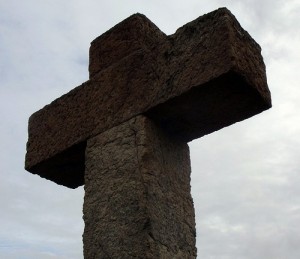On this Good Friday, I’d like to share a hymn with you that has helped me center myself on the spiritual meaning and depth of Jesus’s sacrifice. The hymn is entitled “Thee We Adore,” and the English text below is translated from Thomas Aquinas, an important 13th century priest. Tara and I found this hymn through one of the area choirs in which we sing; the tune we sang (by a composer named Candlyn) is hauntingly beautiful.
Thee we adore, O hidden Savior, thee,
Who in thy sacrament art pleased to be;
Both flesh and spirit in thy presence fail.
Yet here thy presence we devoutly hail.

Thomas Aquinas was instrumental in the philosophical arguments behind the Catholic doctrine called “transsubstantiation” – that is, that the bread and wine of the Lord’s Supper literally become the body and blood of Jesus when we share at his table. We in the Church of God do not believe this happens, but we can certainly agree that “both flesh and spirit in thy presence fail.” Being in the Lord’s presence is truly awesome.
O blest memorial of our dying Lord,
Who living bread to men doth here afford!
O may our souls forever feed on thee,
And thou, O Christ, forever precious be.
Jesus taught us that he is the Bread of Life (John 6:22-59). When we share at the Lord’s table, we are reminded that he is true food and true drink. And when we gather at the foot of the cross, we are reminded of the truth behind the meal that we share: the bread and wine remind us of the great price Jesus paid so that we might have forgiveness and relationship with him.
Fountain of goodness, Jesu, Lord and God,
Cleanse us, unclean, in thy most cleansing flood.
Increase our faith and love, that we may know
The hope and peace which from thy presence flow.
Jesu, short for Jesus, is the source of all hope and peace. His blood is a “most cleansing flood” that can wash us clean from sin through faith and love. This season is a powerful time to remember, to wash, and to remain quietly in his presence.
O Christ, whom now beneath a veil we see,
May what we thirst for soon our portion be,
To gaze on thee unveiled, and see thy face,
The vision of thy glory and thy grace.
Our hope is always for a future with Jesus Christ. When we stand at the foot of the cross, at the tomb containing Jesus’s body, we wait for a yet-to-be-revealed future. When we see the bread of the Lord’s Supper hidden beneath a cloth, we yearn for the time when we can see Christ face to face. Until then, we thirst, we hunger, we meditate, we draw close to Christ, we hold vigil at the tomb.
I’ll see you on the other side.
–Pastor David